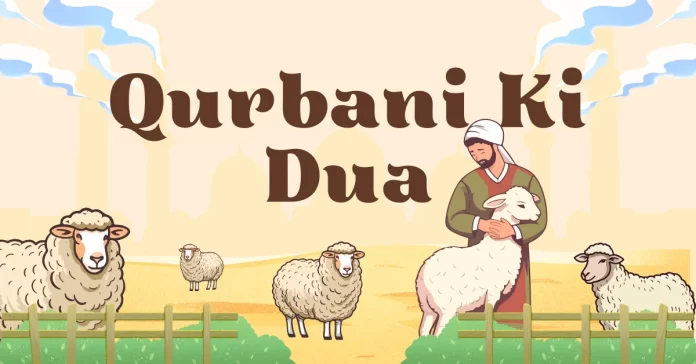Introduction to Qurbani ki Dua
Qurbani, or Udhiyah, is an essential act of sacrifice performed by Muslims during Eid-ul-Adha in remembrance of Prophet Ibrahim’s (AS) devotion and obedience to Allah. Central to this sacred act is the recitation of Qurbani ki Dua, symbolizing faith, submission, and gratitude. This blog explores the significance, correct recitation, and deeper meaning of the Qurbani ki Dua, including related verses from the Quran and prophetic supplications.
Importance of Qurbani in Islam
Qurbani commemorates Prophet Ibrahim’s (AS) readiness to sacrifice his son, Prophet Ismail (AS), in obedience to Allah’s command. It signifies unwavering faith, submission, and the willingness to sacrifice worldly attachments for the pleasure of Allah. The ritual reminds Muslims of their duties toward the Creator and the less fortunate.
The Essential Qurbani Ki Dua
Complete Dua Before Slaughtering the Animal
إِنِّي وَجَّهْتُ وَجْهِيَ لِلَّذِي فَطَرَ السَّماَوَاتِ وَالأَرْضَ حَنِيفَاً وَمَا أَنَا مِنَ الْمُشْرِكِينَ
إِنَّ صَلاتِي وَنُسُكِي وَمَحْيَايَ وَمَمَاتِي لِلَّهِ رَبِّ العَالَمِينَ
لاَ شَرِيكَ لَهُ وَبِذَلِكَ أُمِرْتُ وَأَنَا أَوَّلُ المُسْلِمِينَ
اللَّهُمَّ مِنْكَ وَلَكَ
Transliteration:
Inni wajjahtu wajhiya lilladhi fataras-samawati wal-arda hanifan wama ana minal-mushrikeen. Inna salati wa nusuki wa mahyaya wa mamati lillahi rabbil-alameen. La sharika lahu wa bidhalika umirtu wa ana awwalul-muslimeen. Allahumma minka wa laka.
Meaning:
“I have turned my face sincerely toward the One who created the heavens and the earth, following the way of Ibrahim, who was pure in faith, and I am not among the polytheists. Truly, my prayer, my sacrifice, my living, and my dying are for Allah, Lord of the worlds. He has no partner. This is what I have been commanded, and I am the first to submit. O Allah, this (sacrifice) is from You and for You.”
Qurbani Ki Dua While Slaughtering the Animal
بِسْمِ ٱللَّهِ ٱللَّهُ أَكْبَرُ
Transliteration:
Bismillah, Allahu Akbar
Meaning:
“In the name of Allah, Allah is the Greatest.”
This dua is recited at the time of making the sacrifice, ensuring the act is performed sincerely for Allah’s sake.
Intention (Niyyah) for Qurbani
Before the act of Qurbani, it is essential to make the intention (Niyyah) with sincerity and humility:
اللَّهُمَّ هَذَا مِنْكَ وَلَكَ
Transliteration:
Allahumma Haaza Minka Wa Laka.
Meaning:
“O Allah, this is from You and for You.”
Steps for Performing Qurbani with Correct Supplications
Performing Qurbani involves specific steps rooted in Islamic traditions. Here’s how to ensure the ritual is done properly:
1. Selection of the Animal
- The animal must be healthy and free from physical defects.
- Acceptable animals include goats, sheep, cows, buffaloes, and camels.
2. Preparation for Qurbani
- Perform ablution (Wudu).
- Face the animal toward the Qiblah (Kaaba).
- Ensure the environment is clean and the knife is sharp for a humane slaughter.
3. Making the Intention (Niyyah)
- Make the intention silently or verbally, confirming that the act is solely for Allah’s pleasure.
4. Reciting the Dua
- Place your hand on the animal while reciting the Qurbani ki Dua mentioned above.
5. Slaughtering the Animal
- Recite “Bismillah, Allahu Akbar” while making the cut swiftly.
6. Meat Distribution
- The meat should be divided into three portions:
- For personal consumption
- For relatives and friends
- For the poor and needy
Islamic Significance of Qurbani in the Quran and Hadith
Quranic Verse on Sacrifice
“Their meat will not reach Allah, nor will their blood, but what reaches Him is piety from you.”
(Surah Al-Hajj: 37)
This verse emphasizes that Qurbani is more than a physical act; it is a spiritual offering symbolizing submission, gratitude, and devotion.
Prophetic Hadith on Qurbani
The Prophet Muhammad (PBUH) said:
“There is nothing dearer to Allah during the days of sacrifice than the shedding of blood. The sacrificed animal will come on the Day of Judgment with its horns, hair, and hooves. The blood of the sacrifice reaches the acceptance of Allah before it falls on the ground. So be content when you offer it.” (Tirmidhi)
Rules and Conditions for Qurbani
- Financial Obligation:
- Qurbani is wajib (obligatory) for Muslims who meet the Nisab threshold, similar to Zakat eligibility.
- Time of Qurbani:
- The sacrifice should be performed after the Eid prayer on the 10th, 11th, or 12th of Dhul-Hijjah.
- Animal Health:
- The animal must be healthy and free from defects such as blindness, missing limbs, or illness.
- Humane Treatment:
- Treat the animal kindly and minimize suffering during the slaughter.
Common Misconceptions About Qurbani
- Qurbani is Only for the Rich:
- While Qurbani is obligatory for those meeting the Nisab threshold, Muslims of all financial statuses can participate by sharing larger animals.
- It’s Just About Meat Distribution:
- The act of Qurbani is about submission to Allah, not merely distributing meat.
- Shared Sacrifice:
- Larger animals like cows and camels can be shared by up to seven people, while smaller animals require individual offerings.
Final Thoughts on Qurbani Ki Dua
Reciting the Qurbani ki Dua with sincerity and humility transforms the ritual of sacrifice into an act of spiritual devotion. It reminds Muslims of their duties toward Allah, strengthens their faith, and promotes compassion toward humanity through charity.
May Allah accept our sacrifices and grant us His boundless mercy and forgiveness. Ameen.
FAQs on Qurbani Ki Dua
Q1: Can Qurbani be performed on behalf of others?
Yes, Qurbani can be offered on behalf of family members, including deceased relatives.
Q2: Is it mandatory to recite the Qurbani ki Dua?
Yes, reciting the appropriate dua is necessary for the sacrifice to be spiritually complete.
Q3: Can the meat be kept entirely by the sacrificer?
No, the meat must be distributed fairly among family, friends, and the needy.

